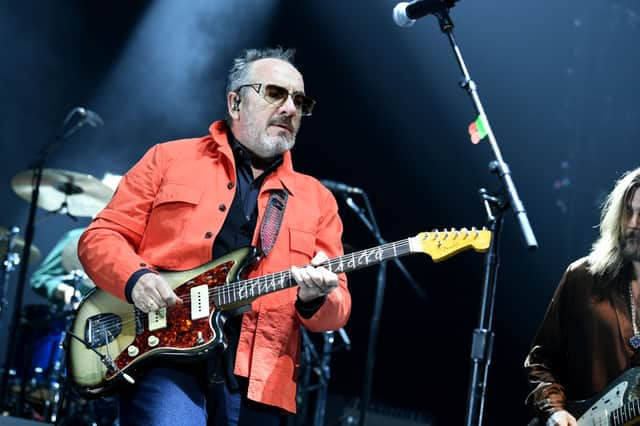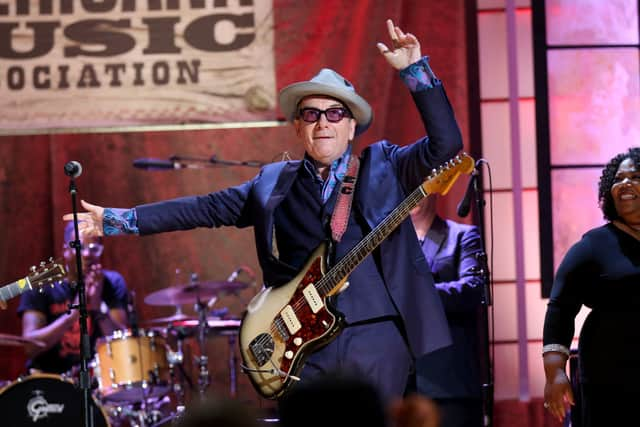Oliver’s Army lyrics: why Elvis Costello wants radio stations to stop playing the song - racial slur explained
This article contains affiliate links. We may earn a small commission on items purchased through this article, but that does not affect our editorial judgement.


Singer-songwriter Elvis Costello has announced that he will no longer be playing his song Oliver’s Army, which is his highest-charting single, and has urged radio stations to do the same.
The song, which featured on the 1979 album Armed Forces, was written after Costello watched British soldiers patrolling the streets of Belfast in 1978.
Why doesn’t he want radio stations playing Oliver’s Army?
Advertisement
Hide AdAdvertisement
Hide AdCostello revealed that he would be retiring the song in its entirety, choosing to no longer perform it during live shows, and urged radio stations to cease playing it as well.
The song, which featured on his 1979 album Armed Forces, had been written about the conflict in Northern Ireland, with Costello stating that the phrase in question was what his grandfather had gotten called whilst serving in the British Army.


It was a slur used to describe Irish Catholics at the time.
The lyric says: “Only takes one itchy trigger/ One more widow, one less white [N-word].”
Talking to the Telegraph about the slur, Costello said: “If I wrote that song today, maybe I’d think twice about it.
Advertisement
Hide AdAdvertisement
Hide Ad“It’s historically a fact. But people heard that word go off like a bell and accuse me of something that I didn’t intend.”
Why doesn’t he just rewrite the verse?
In the past, Costello had actually rewritten the song to make a comment on censorship, specifically referring to the BBC, which had attracted criticism after editing out the verse in 2013.
He said: “On the last tour, I wrote a new verse about censorship, but what’s the point of that?
“So I’ve decided I’m not going to play it. [Bleeping the word] is a mistake. They’re making it worse by bleeping it for sure.
Advertisement
Hide AdAdvertisement
Hide Ad“Because they’re highlighting it then. Just don’t play the record!”


Speaking to the Guardian, Costello also said: “Sadly that two-word slang is a historical fact. It was a derogatory term for Irish Catholics which I use to make the point.
“One dreads to think about how the officer class spoke about people of colour. Perhaps I’d express the same idea differently now.
“I’ve tried changing the verse, but after 44 years I’m done singing it.”
Advertisement
Hide AdAdvertisement
Hide AdCostello also commented that by retiring Oliver’s Army altogether, radio stations would be doing him “a favour”.
He added: “Because when I fall under a bus, [the radio stations] will play She, Good Year for the Roses and Oliver’s Army.
“I’ll die, and they will celebrate my death with two songs I didn’t write. What does that tell you?”
Costello covered the song She by Charles Aznavour in 1999, and Good Year for the Roses in 1981, which was originally written by Jerry Chestnut and performed by George Jones.
Have other artists chosen to retire songs?
Advertisement
Hide AdAdvertisement
Hide AdIt’s not unheard of for certain bands and artists to retire a song - many have done so for a variety of different reasons.
The Rolling Stones made the decision to pull their song Brown Sugar, which was one of their most famous hits, from their live setlists last year due to its references to slavery and black women.
Rolling Stones frontman Sir Mick Jagger told the LA Times: “We’ve played Brown Sugar every night since 1970, so sometimes you think, we’ll take that one out for now and see how it goes.”
Misery Business was one of Paramore’s biggest hits as well, however the band made the decision to stop playing it at concerts a few years ago.
Advertisement
Hide AdAdvertisement
Hide AdSpeaking to the audience at a gig in Nashville in 2018, lead singer Hayley Williams said: “Tonight we’re playing this song for the last time for a really long time. This is a choice that we’ve made because we feel that we should, we feel like it’s time to move away from it for a little while.”


Previously, Williams discussed the song, in which she calls another woman a “whore”, in a blog post.
She wrote: “I’ll say this: Misery Business is not a set of lyrics that I relate to as a 26-year-old woman. I haven’t related to it in a very long time. Those words were written when I was 17… admittedly, from a very narrow-minded perspective.”
Radiohead also decided to stop playing Creep because, as guitarist Johnny Greenwood once said: “We seemed to be living out the same four and a half minutes of our lives over and over again. It was incredibly stultifying.”
Advertisement
Hide AdAdvertisement
Hide AdOne time during a show, when fans began requesting the song, singer Thom Yorke shouted back: “F**k off, we’re tired of it.”
A message from the editor: Thank you for reading. NationalWorld is a new national news brand, produced by a team of journalists, editors, video producers and designers who live and work across the UK. Find out more about who’s who in the team, and our editorial values. We want to start a community among our readers, so please follow us on Facebook, Twitter and Instagram, and keep the conversation going. You can also sign up to our newsletters and get a curated selection of our best reads to your inbox every day.
Comment Guidelines
National World encourages reader discussion on our stories. User feedback, insights and back-and-forth exchanges add a rich layer of context to reporting. Please review our Community Guidelines before commenting.
